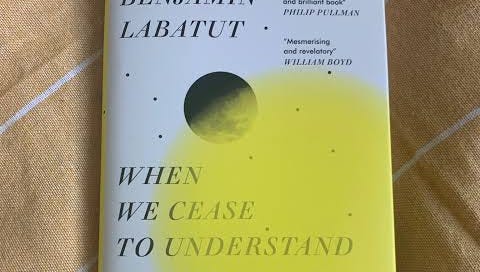When We Cease To Understand The World: A Book Review
When We Cease To Understand The World by Benjamin Labatut
This is an unprecedented achievement in narration. Benjamin Labatut wrote a book that diagnoses the slim line between genius and insanity. It turns out, many of those we celebrate as public genius, inventors, and scientists had an un-understandable life. Benjamin Labatut covers the life of the most prominent scientist of the past century, telling us their story with facts and fiction.
A major achievement of this book is how Benjamin pierces fiction right beside facts to tell a compelling story. As the story progress, so does the fictional part of the stories, each chapter takes us farther from the facts into fiction. However, Benjamin maintains a narrative that makes it nearly irrelevant to sort out the facts vs fiction.
In this book, Benjamin Labatut tells us about the troubling thinking and lifestyle of scientists such as Fritz Haber, Karl Schwarzschild, Werner Heisenberg, Alexander Grothendieck, Shinichi Mochizuki amongst others. He pierces his narrative covering a wide range of time, touching on almost every major scientist including Albert Einstein and the Solvay Conference.
I particular like this excerpt about Einstein;
This was more than Einstein could bear.
The iconoclast physicist par excellence refused to accept such a radical change. That physics should cease to speak of an objective world was not only a change in its point of view—it was a betrayal of the very spirit of science. For Einstein, physics must speak of causes and effects, and not only of probabilities. He refused to believe that the facts of the world obeyed a logic so contrary to common sense. Chance could not be enthroned at the expense of the notion of natural laws. There had to be something deeper. Something not yet known. A hidden variable that could dissipate the fog of Copenhagen and reveal the order that undergirded the randomness of the subatomic world. He was convinced of this, and over the next three days proposed a series of hypothetical situations that seemed to violate Heisenberg’s uncertainty principle, which was the basis of the Copenhagen physicists’ reasoning.
Every morning at breakfast—mirroring the official debates—Einstein would proffer his riddles, and every night Bohr would arrive with a solution. The duel between the two men dominated the conference, and divided the physicists into two opposing camps, but, in the end, Einstein had to yield. He had not found a single inconsistency in Bohr’s reasoning. He accepted defeat grudgingly, and condensed all his hatred of quantum mechanics in a phrase he would repeat time and again in the succeeding years, one he practically spat in the Dane’s face before his departure:
“God does not play dice with the universe!”
Iconic Einstein, “God does not play dice with the universe”. A serious thing this book made me think about the world is FOUNDATIONS. It reoccurs in several places in the book that each time a scientist or mathematician came to the realization of his invention, he was excited and terrified. Isn’t it astonishing that the same equations that led to the invention of nitrogen which helped to feed the world also led to the invention of gases that led to the death of many people? Isn’t it astonishing that the same discoveries that led to the internet also led to weapons of mass destruction like Hiroshima?
We are all standing on a slim fence, we must be constantly vigilant. And especially in the era where data is king, and so much more is at stake, we must never forget that the tools we have could be good gifts or terrible weapons.
I enjoyed this book simply for its narration, the lessons I picked along was probably the hidden ones. Labatut is an excellent narrator, he ends his book with a garden! How lovely, it reminded me of the poem by Henry Thoreau ;
“I went to the woods because I wished to live deliberately, to front only the essential facts of life, and see if I could not learn what it had to teach, and not, when I came to die, discover that I had not lived.”
When We Cease To Understand The World is a book about when scientists, inventors, and mathematicians cease to understand themselves, not the world! And Marie Curie, the scientist who won the Nobel Prize twice has some advice “Nothing in life is to be feared, it is only to be understood. Now is the time to understand more, so that we may fear less.”




